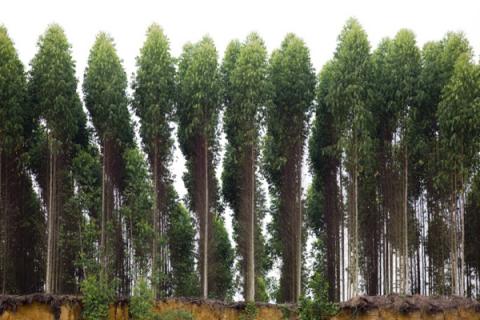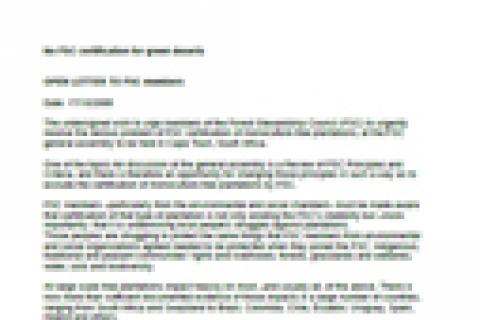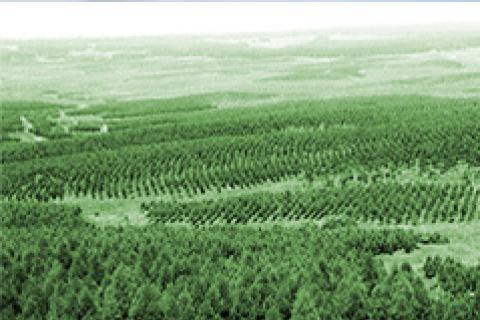Later this year, United Fiber Systems plans to open a new 700,000 tonnes a year wood chip mill at Alle-Alle on the island of Pulau Laut. The mill is the first step of UFS’ proposed pulp developments for Kalimantan. The wood chips will be exported to feed pulp and paper mills in China.
Other information
The International Union of Forest Research Organizations (IUFRO) conference “Forest Plantations Meeting: Sustainable Forest Management with Fast Growing Plantations” 10-13 October, 2006 encountered heavy opposition by several environmental and ecological justice groups.
The Sustainable Forestry Initiative - launched in 1995 by the American Forest & Paper Association (AF&PA), the most powerful timber trade association in the world - covers an area over 40,485,830 ha in the United States and Canada. It is, in essence, a certification scheme by the forestry industry for the forestry industry. AF&PA member companies, including the largest loggers in the United States and Canada and the largest wholesale distributors of global wood products, account for 82% of the funds of SFI.
For some months now, declarations have been circulating in Southern Brazil and in Uruguay, both by members of the Swedish-Finnish company Stora Enso and by Government authorities of these countries regarding the advantages for the local population of the installation of the company’s pulp mills in the region.
Establishment of monocultures of fast-growing trees to produce so-called fast-wood has accelerated in Cambodia following the country’s transition to a market-oriented economy in the early 1990s. Proposed and established plantations under the development paradigm of ‘economic concessions’ include fast-woods acacia, pine and eucalyptus. The majority of these economic concessions violates Cambodian law and there is little evidence that they create the proposed benefits and income for the state.
The study by the United Nations Food and Agriculture Organization (FAO) “Preliminary Review of Biotechnology in Forestry Including Genetic Modification” (ftp://ftp.fao.org/docrep/fao/008/ae574e/ae574e00.pdf), released in December 2004, summarized the state of biotechnology in forestry generally with a specific look at genetic modification of trees. In their findings they report 225 outdoor field trials of GM trees worldwide in 16 countries. Unfortunately they do not differentiate which field trials are current and which occurred in the past, painting a somewhat skewed picture.
Wherever industrial tree plantations are planted in the South, governments provide a range of subsidies to investors. In Indonesia, the government has handed out billions of dollars for plantation development. The plantation and pulp sectors have also received generous aid support. The World Bank and the Asian Development Bank funded studies in the 1980s. A range of export credit agencies helped finance the construction of pulp mills.
In our previous issue (WRM bulletin 109) we made reference to the promotion of oil palm plantations, denouncing their negative impacts on the Amazon forest and on displaced peasants.
The wave of plantations continues, with other types of alien trees. In July of this year the National Reforestation Plan was submitted, promoting plantations for commercial and industrial purposes. Adopted in January 2006, the plan set out an average annual rate of plantation of 104,500 hectares from now until the year 2024.
The history of the plantation industry in South Africa can be compared with the development of plantations elsewhere in the South: in Brazil, Aracruz Cellulose was developed under a military dictatorship; Indonesia’s pulp boom was planned and put into operation during the Suharto regime; Cambodia, Thailand and Chile provide other examples of how state oppression has benefitted pulp/plantations companies.
We, the undersigned entities and individuals of the Alert Against the Green Desert Network, wish to express our concern about the history and awardees of the FSC certifications in Brazil, thus legitimating large scale tree monocultures, although the systematic violation of social, environmental and economic rights by these large agrochemical plantations has been thoroughly evidenced.



